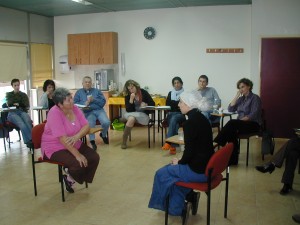A Culturally Competent ALYN Rehabilitative Hospital during a Summer of War
It has been a difficult summer in Jerusalem, and for the region. It has been especially difficult for Israel’s hospitals, who treat all who come through their doors, but who must also deal with the effects of the conflict – on both sides – on patients and their families. It has even been difficult for the ALYN Rehabilitative Hospital, which should be one of the institutions best equipped to deal with this tension. With our help, ALYN was the first hospital in Israel to become fully culturally competent. Thanks to the support of the Jerusalem Foundation and the Sobell Foundation we’ve been working with ALYN since we began developing our Cultural Competency in the Health Care System program in 2008. ALYN has since become the model for other health care institutions in Israel. See here for more information about our Cultural Competency programs in general, and here for more information about our work at ALYN.
Dr. Maurit Beeri, Director General of ALYN, recently wrote a very interesting and important article in the Jerusalem Post about their work through this difficult summer of war and hatred: “Living together when the shadows grow long“. Here is a downloadable version: Living together when the shadows grow long.
Dr. Maurit Beeri writes in her article:
“I was a young department director at ALYN Hospital Pediatric Rehabilitation Center a decade ago when I first learned of the concept of “cultural sensitivity in health.” We can take better care of our patients, I learned, if we understood better their cultural concepts of sickness and healing, their faith and their folklore.
Together with the Jerusalem Inter-Cultural Center we developed a curriculum which helped us make ALYN more geared toward our patients’ families.”
We are proud to be partners to this important success story! Reading the rest is a must to anyone who wants to learn more about the challenges and successes in cultural competence in Jerusalem and in every place in which social and political tensions are an obstacle for medical work.

